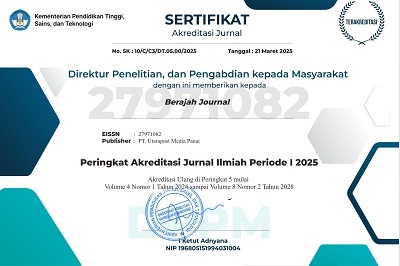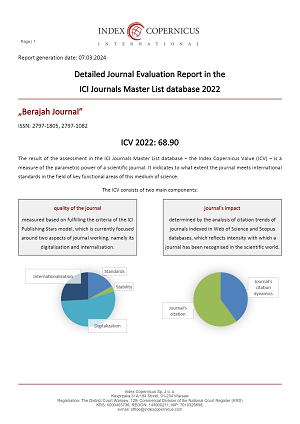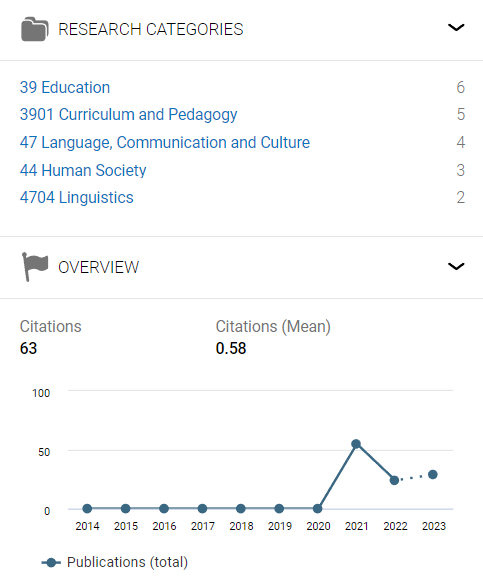MODEL PENGEMBANGAN DESTINASI WISATA NIRWANA GARDEN BALI DI KABUPATEN JEMBRANA BERBASIS GREEN TOURISM DALAM MEWUJUDKAN PARIWISATA BERKELANJUTAN
Main Article Content
I Putu Arya Wahyu Widiantara
Made Budiarsa
I Made Darsana
The decline in tourist visits and environmental management challenges at Nirwana Garden Bali highlight the need for a more sustainable development strategy. This study aims to analyze tourism development, identify the implementation of Green Tourism, and design a sustainable destination development model to enhance competitiveness and local community involvement. A qualitative approach was used to analyze the green tourism-based development model at Nirwana Garden Bali. The research was conducted in Jembrana Regency, Bali, with primary data collected through in-depth interviews, FGDs, observations, and open-ended questionnaires with managers, tourists, and local communities, while secondary data was obtained from official documents and scientific literature. The research instruments included interviews to explore management strategies, FGDs to assess social, economic, and environmental impacts, as well as observations and documentation analysis related to regulations. The findings indicate that Nirwana Garden Bali has the potential to become a sustainable tourism destination through the development of eco-friendly infrastructure and partnerships with local communities. The implementation of green tourism principles, such as energy efficiency, water management, and other environmentally friendly practices, supports sustainability. This development model adopts the Green Tourism Marketing (GTM) and Penthahelix concepts, which promote collaboration among various stakeholders to enhance destination competitiveness while preserving the natural and cultural heritage of Bali.
A, Ibrahim, M. (2015). Metodologi Penelitian Kualitatif. Alfabeta: Bandung.
Amelia, A. D., & Susanti, E. D. (2024). Peran Komunitas Lokal Dalam Membangun Pariwisata Berkelanjutan. Journal Publicuho.
Andi, Oktaviani. (2016)” Pengaruh Budaya Organisasi dan Lingkungan Kerja terhadap Produktivitas.” Jurnal Universitas Haluelo Kendari Sulawesi Tenggara
Anindita (2015). Analisis Faktor-faktor yang Mempengaruhi Tingkat Kunjungan ke Kolam Renang Boja. Semarang: UNDIP Press.
Bahur, (2020). Strategi Pengembangan Agrowisata Bali Kopi Mekar di Desa Gulingan Kecamatan Mengwi Kabupaten Badung. Vol. 10 No. 19 (2020): Agrimeta: Jurnal Pertanian Berbasis Keseimbangan Ekosistem
Buhalis, Dimitros. 2000. Marketing The Competitive Destination of The Future. Tourism. Journal of Management. Volume 21, Issue1.
Braun, V., & Clarke, V. (2006). Using thematic analysis in psychology. Qualitative Research in Psychology, 3(2), 77-101.
Cooper, C., Fletcher, J., Fyall, A., Gilbert, D., & Wanhill, S. (2016). Tourism: Principles and Practice. Pearson Education.
Cooper, C. (2022). Essentials of tourism. SAGE Publication.
Devyanti, N. K. A. S., & Utama, M. S. (2024). Faktor-Faktor Yang Mempengaruhi Niat Kunjungan Kembali Wisatawan Pada Destinasi Wisata di Kabupaten Tabanan. Innovative: Journal Of Social Science Research
Devi, K.D., K. Punyarani., N.S. Singh dan H.S. Devi. (2013). An Efficeint Protocol for Total DNA Extraction from The Members of Order ZingiberalesSuitable for Diverse PCR Based Downstream Application. Springer Plus. 2:1-9
Devy, H, A & Soemanto, R. B. (2017) Pengembangan Obyek dan Daya Tarik Wisata Alam Sebagai Daerah Tujuan Wisata di Kabupaten Karanganyar, FISIP UNS: Jurnal Sosiologi DILEMA, Vol. 32, No. 1
Dewi, A., & Suprapto, H. (2022). Daya Tarik Wisata Alam sebagai Faktor Penentu Kunjungan Wisatawan di Bali. Jurnal Pariwisata Indonesia, 7(2), 115-130.
Dewi (2023). Wawancara, 3 Mei 2023
Dewi (2023). Wawancara, 4 Mei 2023
Edi, E., & Tania, M. (2018). Ketepatan Model Altman, Springate, Zmijewski, Dan Grover Dalam Memprediksi Financial Distress. Jurnal Reviu Akuntansi Dan Keuangan, 8(1), 79.
Evi Fitriana (2018) yang berjudul Strategi Pengembangan Taman Wisata Kum Kum Sebagai Wisata Edukasi di Kota Palangkaraya. Vol 23, No 2 (2018). Jurnal Pendidikan Geografi
Farhan, M. (2021). Model Pengembangan Pariwisata Berkelanjutan: Studi Kasus di Destinasi Wisata Sumatera. Jurnal Pengembangan Pariwisata, 9(1), 20-35.
Gretzel, U., Fesenmaier, D. R., Formica, S., & O'Leary, J. (2006). Searching for the Future: The Role of the Internet in the Tourism Industry. In Information and Communication Technologies in Tourism 2006 (pp. 172-183). Springer, Vienna.
Hasan, H. A. (2022). Pariwisata Halal: Tantangan Dan Peluang Di Era New Normal. PILAR, 13(1), 54-66.
Hidayah, A., Sunarti, S., & Hakim, L. (2017). Potensi dan Pengembangan Objek Wisata Bahari Tulamben, Kabupaten Karangasem, Bali (Doctoral dissertation, Brawijaya University).
Honey, M. (2008). Ecotourism and Sustainable Development: Who Owns Paradise? (2nd ed.). Island Press.
Ibnou-Laaroussi, S., Rjoub, H., & Wong, W. K. (2020). Sustainability of green tourism among international tourists and its influence on the achievement of green environment: Evidence from North Cyprus. Sustainability.
Iqbal Hasan, (2013), Analisis Data Penelitian Dengan Statistik, Jakarta, Bumi Aksara
Isdarmanto. (2017).” Dasar-Dasar Kepariwisataan dan Pengelolaan Destinasi Pariwisata” Yogyakarta: Gerbang Media Aksara dan StiPrAm.
Kaelan. (2012). Metode Penelitian Kualitatif Interdisipliner. Yogyakarta: Paradigma.
Kementerian Pariwisata dan Ekonomi Kreatif Indonesia. (2021). Rencana Strategis Pengembangan Pariwisata 2020-2024. Jakarta: Kementerian Pariwisata dan Ekonomi Kreatif.
Lagodiienko, V., Sarkisian, H., Dobrianska, N., Krupitsa, I., Bairachna, O., & Shepeleva, O. (2022). Green tourism as a component of sustainable development of the region. Management Theory and Studies for Rural Business and Infrastructure Development.
Lamopia, I. W. G., & Nindya, P. A. A. (2023). Pengembangan model baru strategi pemulihan pariwisata bali berbasis wisata berkelanjutan. Jurnal Analisa Sosiologi
Megawati, M., Tahir, T., Hasan, M., & Dinar, M. (2023). Tourism development strategy in improving the community economy at Tanjung Bira Beach, Bonto Bahari District, Bulukumba Regency. Pinisi Journal of Entrepreneurship Review, 1(1), 1-15.
Moleong, L. (2015). Metodologi penelitian kualitatif (Edisi revi). Bandung: PT Remaja Rosdakarya, 2018
Purnamasari, D. (2021). Pengembangan Pariwisata Berkelanjutan di Indonesia. Jurnal Ilmu Pariwisata, 6(2), 85-98.
Purnamasari, Triq, (2021). Mengenal Workation & Bleisure, Konsep Kerja yang Makin Populer. Diakses Pada https://www.pegipegi.com/travel/mengenal-workation-bleisure-konsep-kerja-yang-makin-populer/. Diakses pada tanggal 3 Mei 2023
Putri, R., & Hasan, A. (2021). Pengaruh Daya Tarik Wisata Terhadap Kepuasan Wisatawan di Destinasi Wisata Bali. Jurnal Ilmu Pariwisata, 5(1), 45-60.
Ramadhan, R. (2022). Peran Komunitas Lokal dalam Pengembangan Pariwisata Berkelanjutan di Daerah Destinasi Wisata. Jurnal Pariwisata Berkelanjutan, 8(3), 78-90.
Ridwan, Mohamad dan Aini, Windra. (2019). Perencanaan Pengembangan Daerah Tujuan Pariwisata. Yogyakarta: Deepublish.
Safi’i, F, M dan Satlita. (2016). Pelaksanaan Strategi Dinas Pariwisata dan Kebudayaan dalam Meningkatkan Jumlah Kunjungan. Jurnal Pariwisata. Vol. 5 No. 10. Universitas Negeri Yogyakarta.1-12
Santosa, B., & Yuniar, R. (2023). Pengembangan Destinasi Wisata Berkelanjutan Melalui Pendekatan Green Tourism. Jurnal Kajian Pariwisata, 10(2), 150-165.
Soeswoyo, D. M., Jeneetica, M., Dewi, L., Dewantara, M. H., & Asparini, P. S. (2021). Tourism potential and strategy to develop competitive rural tourism in Indonesia. International Journal of Applied Sciences in Tourism and Events, 5(2), 131-141.
Sugiama, A. G. (2011). Ecotourism: Pengembangan Pariwisata berbasis konservasi alam. Bandung: Guardaya Intimarta.
Sukendar, N. M. C., Pitana, I. G., & Diarta, I. K. S. (2021). Pengaruh Atribut dan Kualitas Layanan Agrowisata Taman Edelweis Terhadap Kepuasan dan Niat Berkunjung Kembali Wisatawan di Tengah Pandemi Covid–19. Jurnal Manajemen Agribisnis
Supriyanto, A. (2020). Strategi Pengembangan Destinasi Pariwisata Berkelanjutan di Indonesia. Jurnal Pembangunan Wilayah, 12(1), 30-45.
Sustainable Tourism Council. (2015). Sustainable Tourism: Criteria for Success. Retrieved from Sustainable Tourism Council website.
Thang, N. D., & Thanh, N. N. (2023). Dalam penelitian berjudul "The Relationship Between Awareness and Commitment to Participate in the Green Tourism Model of Local Communities: Evidence from the Hmong People Community in Lao Cai Province-Vietnam. International Journal of Professional Business Review.
UNWTO. (2020). Sustainable Development of Tourism: A Comprehensive Approach. Madrid: World Tourism Organization.
Widiastuti, S. (2020). Analisis Potensi Wisata Berbasis Lingkungan di Bali. Jurnal Sumber Daya Alam dan Lingkungan, 6(2), 100-115.
Wina, Sanjaya. (2016). Strategi Pembelajaran Berorientasi Standar Proses Pendidikan. Jakarta: Prenadamedia Group.






























